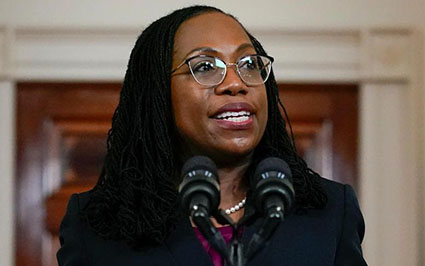by WorldTribune Staff, March 18, 2022
Joe Biden’s choice for the Supreme Court engaged in an “alarming pattern” of “letting child porn offenders off the hook for their appalling crimes,” Missouri Republican Sen. Josh Hawley said.
Hawley, who met with Judge Ketanji Brown Jackson last week as part of her rounds on Capitol Hill ahead of Senate Judiciary Committee hearings next week, said he is “concerned that this is a record that endangers our children.”

“As far back as her time in law school, Judge Jackson has questioned making convicts register as sex offenders — saying it leads to ‘stigmatization and ostracism.’ She’s suggested public policy is driven by a ‘climate of fear, hatred & revenge’ against sex offenders,” Hawley tweeted.
Biden nominated Jackson to replace retiring Justice Stephen Breyer.
One of the cases Hawley cited as part of Jackson’s “pattern” toward sexual offenders was the United States v. Hawkins, which involved a defendant who had “multiple images of child porn.”
“He was over 18,” Hawley wrote. “The Sentencing Guidelines called for a sentence of up to 10 years. Judge Jackson sentenced the perpetrator to only 3 months in prison. Three months.”
Other cases cited by Hawley included:
• “In United States v. Cooper, in which the criminal had more than 600 images and videos and posted many on a public blog, the Guidelines called for a sentence of 151-188 months. Judge Jackson settled on 60 months, the lowest possible sentence allowed by law.”
• “In United States v. Chazin, the offender had 48 files of child porn, which he had accessed over a period of years. The Guidelines recommended 78-97 months. Judge Jackson gave him 28.”
• “In United States v. Downs, the perp posted multiple images to an anonymous instant messaging app, including an image of a child under the age of 5. The Guidelines recommended 70-87 months. Judge Jackson gave him the lowest sentence allowed by law, 60 months.”
• “In United States v. Savage, the sex offender was convicted of travel with intent to engage in illicit sexual conduct, and also admitted to transporting child porn. The Guidelines recommended 46-57 months. Judge Jackson gave him 37.”
“This is a disturbing record for any judge, but especially one nominated to the highest court in the land. Protecting the most vulnerable shouldn’t be up for debate. Sending child predators to jail shouldn’t be controversial,” Hawley tweeted.
Jackson received her commission as a U.S. Circuit Judge in June 2021. From 2013-21, she served a U.S. district judge, and until December 2014, she also served as a vice chair and commissioner on the U.S. Sentencing Commission.
“So far, the Sentencing Commission has refused to turn over all Judge Jackson’s records from her time there. In light of what we have learned, this stonewalling must end. We must get access to all relevant records,” Hawley tweeted.
Meanwhile, supporters of Jackson who want to champion her “beyond just being the first black woman headed to the Supreme Court” as well as critics “who want something to sink their teeth into,” are finding Jackson’s resume lacking, Washington Examiner columnist Paul Bedard noted on March 7.
According to the Congressional Research Service, much of Jackson’s district court work was on procedural topics, not those the Supreme Court studies. “This uncertainty is especially pronounced when evaluating Judge Jackson because she has spent most of her judicial tenure as a district court judge,” the service said in a report reviewed by Secrets.
“Judge Jackson has resolved relatively few cases involving open constitutional questions, offering somewhat limited insight into what mode of constitutional interpretation she might follow in future cases,” the report added.
Bedard cited Josh Blackman, a professor at the South Texas College of Law in Houston as saying that Jackson’s path to the court was not only odd but provided little help in figuring out her philosophy.
“I’ve looked at her opinions,” he said. “I don’t see, you know, rock star. I don’t see the superstar. She only had a couple of noteworthy opinions. I didn’t hear her giving any sort of influential speeches. She didn’t really write articles. There wasn’t much that distinguished her. I mean, nothing. That’s not a criticism. It wasn’t bad, but it just wasn’t that she was the greatest thing in the world.”
Blackman added that Jackson has no record of working with other judges to get them to agree with her view of constitutional law, a basic chore on the Supreme Court. “How is she going to persuade John Roberts, Brett Kavanaugh, or Amy Coney Barrett in a case? She has no experience doing that.”
Blackman, a constitutional law professor, was asked if the Jackson nomination was similar to Harriet Miers, picked by then-President George W. Bush but scuttled when critics said her experience wasn’t deep.
“I think it’s actually worse because Harriet Miers, for all the criticism, was actually a pretty well-known attorney in private practice in Texas. She had a good reputation. She was White House counsel. People actually had papers to go on, but she hadn’t decided on the bigger constitutional issues. Jackson just doesn’t have much of a record at all,” he said.
About . . . . Intelligence . . . . Membership
